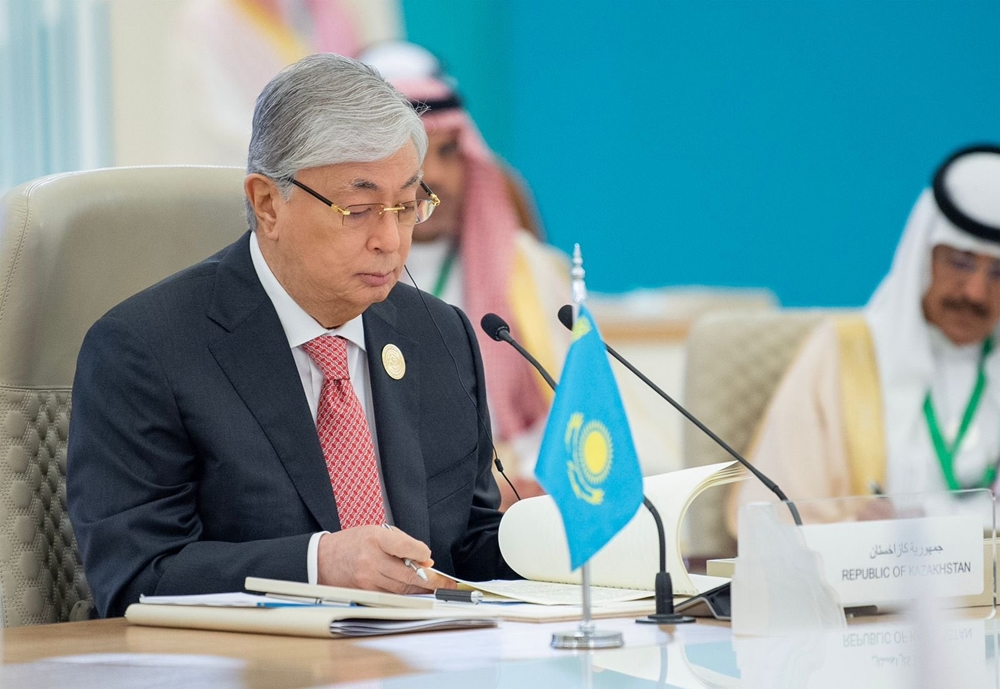Kazakhstan is poised to make a substantial increase in cargo traffic along the Trans-Caspian International Transport Route (TITR), with a target of 500,000 containers per year by 2030.
This ambitious plan was revealed by Kazakh President Kassym-Jomart Tokayev during his speech at the first Central Asia + Gulf Cooperation Council Summit in Jeddah, Saudi Arabia.
“We intend to systematically increase the cargo flow through this route and bring it to 500,000 containers per year by 2030,” President Tokayev said in his speech. “In addition, Kazakhstan is taking measures to develop the North-South International Transport Corridor.”
The president further emphasized the strategic importance of developing the transit and transport sector in the region, as there is a growing demand for diversified routes and improved infrastructure and logistics projects. Central Asian countries are actively working to facilitate trade and bolster economic growth in response to these demands.
The significance of the Trans-Caspian route has grown for Kazakhstan’s economic security, especially as exports through Russian territory have become increasingly difficult due to the fallout from the war in Ukraine.
In 2022, President Tokayev underscored the importance of fully utilizing the potential of the Trans-Caspian International Transport Route, also known as the Middle Corridor. This corridor stretches from China to Europe, passing through Central Asia and the South Caucasus.
The Middle Corridor has emerged as a critical trade route between Europe and Asia, offering considerable economic benefits and faster transit times for the landlocked countries in the region. The primary maritime points on this route are the Baku International Sea Trade Port in Azerbaijan, the Aktau/Kuryk ports in Kazakhstan, and the Turkmenbashi Port in Turkmenistan. These ports promise significant gains for regional trade.
Compared to the Northern Corridor, the Middle Corridor provides a more cost-effective and faster trade route, reducing travel distance by 2,000 kilometers. Additionally, it benefits from more favorable climate conditions and reduces travel time by 15 days compared to sea routes. The Middle Corridor opens up immense opportunities for cargo traffic in Asia, enabling goods to reach the Middle East, North Africa, and the Mediterranean region by integrating port connections in Türkiye.
The strategic location of the Middle Corridor is expected to create significant economic opportunities, allowing South Caucasian and Central Asian countries to benefit from the $600 billion China-Europe trade annually. The establishment of logistics centers and free trade zones at the ports of Azerbaijan, Kazakhstan, and Turkmenistan will facilitate the development and deepening of Trans-Caspian cooperation, providing a boost to regional economies. By effectively leveraging the benefits of the Middle Corridor, the countries in the region can reap the rewards of increased trade and economic growth.







 President Ilham Aliyev shed light on the evolving contours of the peace process with Armenia during an international conference in Baku this week. ...
President Ilham Aliyev shed light on the evolving contours of the peace process with Armenia during an international conference in Baku this week. ...
 Azerbaijan and Armenia started the process of demarcation of their border on Tuesday, with the installation of the first border markers based on ge...
Azerbaijan and Armenia started the process of demarcation of their border on Tuesday, with the installation of the first border markers based on ge...
 Iran and Pakistan have signed eight cooperation documents in various fields, and agreed to strengthen ties to fight terrorism in the region.
Iran and Pakistan have signed eight cooperation documents in various fields, and agreed to strengthen ties to fight terrorism in the region.
 Iranian President Ebrahim Raisi expressed Tehran’s readiness to participate in significant development projects in Sri Lanka during the inauguratio...
Iranian President Ebrahim Raisi expressed Tehran’s readiness to participate in significant development projects in Sri Lanka during the inauguratio...
 As the conflict between Ukraine and Russia escalates, the strategic importance of Kharkiv, Ukraine's second-largest city, has come sharply into focus.
As the conflict between Ukraine and Russia escalates, the strategic importance of Kharkiv, Ukraine's second-largest city, has come sharply into focus.



